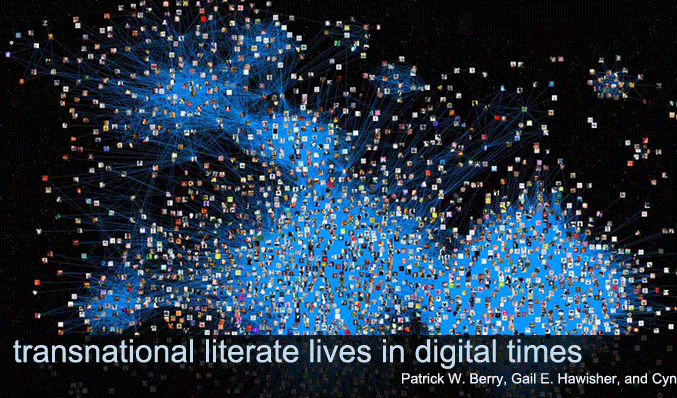ACKNOWLEDGMENTS
We have been working on Transnational Lives in Digital Times since before 2006, the year when we first presented parts of this research at the Conference on College Composition and Communication (CCCC). In fact, sometimes it feels as though we have been working toward the realization of this book for all our academic lives—and, perhaps in some sense that’s true. In the 1980s and 1990s, we began studying how early digital writing technologies had begun to influence our students’, our colleagues’, and our own writing lives, or “literate activity,” as Paul Prior (1998) might conceive and describe it. We have been having a go at this research ever since and continue to do so, relying on the good work, support, and suggestions of colleagues within the always-growing field of rhetoric and composition/writing studies and beyond. For their inspiration and suggestions for this—our first born-digital book—we thank Marilyn Cooper, H. Lewis Ulman, Karl Stolley, Paul Prior, Eileen Schell, Ben McCorkle, Cheryl Ball, Valerie Lee, Patrick Williams, and the many extraordinary individuals at the University of Illinois, Ohio State University, and Syracuse University who helped provide the time and resources necessary to bring this study to fruition. Thanks also to Janine Solberg, Maria Lovett, Susan Delagrange, and Joseph Squier for the aesthetic models that they constantly bring to the field.
Thanks to those editors who have published parts of this research in the pages of their journals and edited collections:
Kristine Blair, editor of Computers and Composition Online, “Digital Composing: Remaking Stories of Research, Literacy, and Life” (2010) http://www.bgsu.edu/cconline/digitalcomposing/
Jennifer Holberg and Marcy Taylor, editors of Duke University’s Pedagogy: Critical Approaches to Teaching Language, Literature, Composition, and Culture, “Globalism and Multimodality in a Digitized World: Computers and Composition Studies” (2010).
Min-Zhan Lu, Paul Kei Matsuda, and Bruce Horner, special issue editors of College English, “Globalization and Agency: Designing and Redesigning the Literacies of Cyberspace” (2006).
Published or forthcoming book chapters related to this research include
“Beyond Literate Lives: Collaboration, Literacy Narratives, Transnational Connections, and Digital Media” forthcoming in Literacy, Economy, and Power: Writing Research Ten Years After Literacy in American Lives (editors: Julie Nelson Christoph, John Duffy, Eli Goldblatt, Nelson Graff, Rebecca Nowacek, and Bryan Trabold).
“Exceeding the Bounds of the Interview: Feminism, Mediation, Narrative, and Conversations about Digital Literacies” forthcoming in New Directions in Writing Studies Research. (editors: Mary Sheridan and Lee Nickoson), Carbondale: Southern Illinois University Press.
"Globalization, Guanxi, and Agency: Designing and Re-designing the Literacies of Cyberspace." (2010). Cross-Language Relations in Composition. (editors: Bruce Horner, Min-Zhan Lu, and Paul Matsuda), Carbondale: Southern Illinois University Press.
We have also been blessed with the superb editorial work of Benay Bubar. Without her careful attention to every word of Transnational Literate Lives in Digital Times, we would have been hard put to present what we hope will be a productive and exciting experience for readers and viewers.
Over the years, many colleagues have provided venues that have allowed us to talk about the research on transnational literate lives and receive valuable responses to our work. We received kind invitations to present as featured speakers at CCCC, as well as at additional conferences such as the Thomas R. Watson Conference in Rhetoric and Composition at the University of Louisville and the International Conference on University Literacies: Knowledge, Writing, Disciplines at Charles de Gaulle University in Lille, France. Other universities that have supported this research include the University of New South Wales in Sydney, Australia; Peking University in Beijing, China; St. Petersburg State University in St. Petersburg, Russia; and the many institutions who have hosted Computers and Writing conferences across the United States. Syracuse University, Virginia Tech, and the University of Southern California also extended generous invitations for symposium presentations. Others too have invited us to speak about our research, most recently at the Global Studies Conference in Rio de Janeiro, Brazil. We are indebted as well to our Norwegian colleagues who have given us important opportunities for presenting this work globally: Andrew Morrison at the University of Oslo’s InterMedia and the Oslo School of Architecture and Design, Helge Rønning at the Institute of Communication and Media at the University of Oslo, and Barbara Gentikow at the Department of Informatics and Media Studies at the University of Bergen.
And what would we ever have accomplished without the ongoing contributions and patience of Transnational Literate Lives’ coauthors with whom we continue to turn for guidance? When we first began working with them, some were undergraduates, others graduate students, with roots in countries ranging from Indonesia to Norway, Nigeria to Australia, Bangladesh to Peru, South Korea to Mexico, Bosnia to China, and beyond. Their diverse, multifaceted, and insightful perspectives—along with their experiences with how literacy practices, their knowledge of English, and the changing role of digital media affect their lives—make up the heart of this book.
We are indebted to the graduate students with whom we continue to work and from whom we always learn. They have supported all that we do in many generous ways, and we are grateful for their participation. Finally, we thank our families and friends, whose contributions are immeasurable, and without whom this work would be impossible.
previous < > INTRODUCTION: Reading TLL














